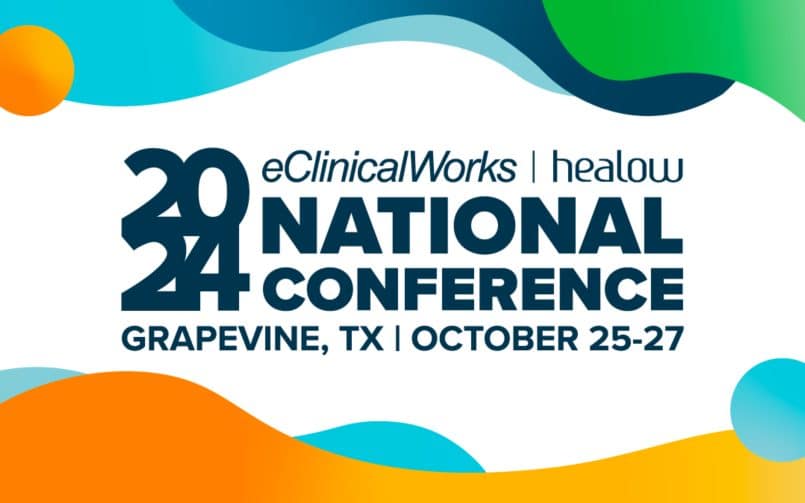eClinicalWorks Blog

- 26 July, 2024
- blog
How to Maximize Efficiency of an AI-Powered Medical Scribe
The healthcare industry has always been a frontrunner in embracing innovations, and artificial intelligence (AI) is no exception. A striking example is the growing use of AI medical scribes like Sunoh.ai, designed to automate clinical documentation and reduce the burden of administrative tasks. According to research, AI scribe saves doctors an hour at the keyboard every day, thereby allowing healthcare providers more time to connect with their patients. Remember, technology is a tool, and effective communication is the secret sauce that will help healthcare professionals get the best out of AI medical scribes. This will not only enhance productivity but also enhance patient satisfaction and overall healthcare delivery. Here are some insightful communication tips to optimize your use of AI medical scribes:
Continue Reading
- 19 July, 2024
- blog
Transforming Rheumatology Workflows with eClinicalWorks
Transforming Medical Documentation with AI: Success Stories from Sunoh.ai In the rapidly evolving healthcare field, accurate and efficient documentation is paramount. Enter Sunoh.ai, a revolutionary Medical AI Scribe designed to streamline clinical documentation. This blog highlights the success stories of those who have benefited from this cutting-edge technology. Saurabh Singh and Rakhee Langer, vice presidents of Sunoh.ai, discuss the advancements of the medical AI scribe and offer intriguing insights into how ambient listening is transforming the healthcare industry. They also share compelling anecdotes from users, such as a provider who can now get home early to spend time with family, showcasing the profound impact of this technology. Watch the Interview with John Lynn from Healthcare IT Today.
Continue Reading
- 11 July, 2024
- blog
The 2024 eClinicalWorks® and healow® National Conference: Grapevine Awaits You!
eClinicalWorks and healow National Conferences are renowned for providing a platform to exchange innovative ideas, discuss trends, and learn about the latest advances in digital healthcare solutions. The history of these national conferences goes back 17 years, with each event introducing key enhancements and innovative features and offering attendees a wealth of knowledge and networking opportunities. Each year, the conference continues to evolve and serve as a catalyst for positive change within the healthcare IT industry. Last year, the 16th annual eClinicalWorks® and healow® National Conference in Nashville was a huge success with the introduction of the eClinicalWorks AI Assistant, the healow no-show predictive tool, and updates to our products and services across the board. Attendees were surprised to witness how harnessing the power of AI can transform patient visits and clinical workflows. This year's conference, held on October 25-27 at the Gaylord Texan Resort & Convention Center in Texas, will showcase innovative healthcare IT solutions from eClinicalWorks and healow and spotlight how artificial intelligence is changing the game in healthcare. Witness how AI-driven tools can help your practice reduce no-shows, boost your bottom line, improve patient satisfaction, and support better health outcomes. Immerse yourself in the keynote address and product showcase, and take advantage of unparalleled networking opportunities with 100+ breakout sessions.
Continue Reading
- 27 June, 2024
- blog
Optimizing RCM for Growth Today and Tomorrow
NYC dermatology practice finds everything it needs with eCW Usually, when something seems too good to be true, it turns out not to be true. But for Gil Messer, chief operating officer of The Dermatology Specialists (TDS), the largest such specialty practice in New York City, what seemed too good to be true really was true — and then some. TDS first engaged eClinicalWorks for Revenue Cycle Management (RCM) services in 2007, when they launched their practice with a single office. Seventeen years and 40 additional sites later, Messer said the need for optimizing their RCM services was clear. “About April of last year,” Messer said, “we had hit a breaking point, where we realized it wasn't sustainable and the root cause was ¬— it was designed and built for that single provider office back in 2007.” With 41 offices and 15 different payer websites to navigate, Messer said that he and his colleagues were having to engage in manual intervention on many claims and were running into a large number of submission errors, leading to administrative headaches, delays in getting paid, and a rising number of days for accounts receivable (A/R).
Continue Reading
- 6 June, 2024
- blog
Dental Practices Keep Brushing Up on Technology
How Sunoh.ai medical scribe can advance care Ask someone to list major medical advances, and they are likely to list such things as the eradication of polio, the development of new drugs, the mapping of the human genome, or breakthroughs that are helping improve cancer survival rates. It’s easy to forget about dental care. But good oral health, so often overlooked, remains a vital part of leading a full and healthy life. The list of advances in dentistry is impressive, from the use of drugs to numb pain to more precise and less invasive ways to detect and treat dental decay. Digital radiography has reduced patients’ exposure to X-rays. Silver amalgams have largely been replaced with safer, natural-looking materials. But there’s another way that today’s dental providers can improve their practices and better serve patients—by adopting an AI medical scribe known as Sunoh.ai. eClinicalWorks recently announced that it is integrating Sunoh.ai into dental clinics across the country.
Continue Reading
- 4 June, 2024
- blog
Physicians Have Limits — Healthcare IT Can Help
Physicians Have Limits — Healthcare IT Can Help Every medical practice is more or less different from every other, whether by virtue of size, location, specialty, or emphasis. But every medical practice, from the smallest rural health center to the largest urban hospital system, shares one economic reality — resources are always limited. Many providers work long hours to serve their patients, often completing their daily documentation in the evening from home. But clocks, calendars, and human endurance sets limits. There are only 24 hours in a day and seven days in a week. Add in a shortage of physicians and ever-increasing demands by patients, and it is not surprising that surveys consistently show that about two-thirds of U.S. providers report at least one symptom of burnout.
Continue Reading
- 24 May, 2024
- blog
Feeling burned out? There’s a tech prescription for that!
While every new physician enjoys the opportunities and challenges of practicing medicine, many doctors soon find themselves among the nearly two-thirds of their profession who regularly report experiencing at least one symptom of burnout. According to an American Medical Association report, that included 62.8 percent of all doctors in the U.S. as of September 2021 — a steady increase over the previous decade. Overworked doctors and their staffs dream about hearing words like “Why don’t you take half a day!” The problem? That usually means taking half a day to complete their documentation. If you’re thinking that this technologically advanced world has to offer a better way to get all that work done, you’re right — they’re called AI medical scribes. Dawn of the AI-powered scribes Humans have been doing medical transcription work for many years. But the remarkable advances in artificial intelligence mean that a new generation of solutions with ambient listening capabilities are now available to complete AI documentation and AI transcription tasks. And most of the time, in most circumstances, these AI-powered scribes are faster, cheaper, and more accurate than even the best humans. They can distinguish accents and multiple speakers and exhibit a high degree of accuracy. AI in primary care practices is particularly important given that these front-line medical practices are in constant high demand and face a long-term shortage of physicians. According to Dr. Joseph Osuagwu, documentation is a widespread issue among providers at his practice, Goodtime Family Care in Baltimore, Maryland. Providers at Goodtime experienced complications with traditional note taking techniques, which were labor-intensive, susceptible to inaccuracies from human mistakes, and frequently interrupted the patient interaction process. On hectic days, capturing the complete HPI and other crucial details was often missed due to a shortage of time.
Continue Reading
- 16 May, 2024
- blog
A Revolutionary Approach to Enhance Clinical Workflows
At some point in the journey of any medical practice, providers and staff encounter the challenge of managing success. With new patients, they need new ways to improve efficiency, speed up workflows, and capture revenue. But how practices think about their healthcare IT can spell the difference between being overwhelmed and successfully managing growth. A traditional approach might work One approach is to simply add new tools for everything from telehealth and Population Health to improved interoperability and billing. That may work, but busy practices often lack the time needed for training. The challenges can be so many — and seem so overwhelming — that practices find themselves underutilizing many of the solutions they are paying for.
Continue Reading
- 10 May, 2024
- blog
eClinicalWorks in The Bahamas: How Our EHR and Pop Health Tools Are Making a Difference
A near neighbor with familiar health challenges The Bahamas lies just southeast of Florida and consists of some 700 islands — 30 of which are inhabited — with a total population of just over 400,000. And while the country enjoys better weather than much of the mainland U.S. on most days, it faces very similar health challenges to those seen in every corner of our nation. For example, according to the Pan American Health Organization, 74 percent of deaths in The Bahamas are from noncommunicable diseases, including heart disease, diabetes, and cancers. Much attention in recent years has centered on the COVID-19 pandemic, which is understandable given the novelty of the threat and the uncertainties faced around the globe. But the reality is that, year after year, most deaths in Western countries are not from novel or unknown conditions but are due to heart disease, diabetes, cancer, and a handful of debilitating neurological conditions. However, understanding and analyzing population health data can help transform healthcare delivery.
Continue Reading
- 7 May, 2024
- blog
AI-Powered Medical Scribe Integration within the EHR is Revolutionizing Clinical Documentation
According to research conducted by 3M and the American Hospital Association, clinical documentation is critical in providing and coordinating care. Their study found that physicians who lack sufficient time for documentation are nearly three times as likely to report symptoms of burnout. That’s why reducing time spent on documentation is essential. This AMA report demonstrates how an AI scribe saves doctors an hour a day from the keyboard. Integrating AI technology into the EHR eases the administrative workload, reduces burnout, increases provider satisfaction, and improves work-life balance. AI functionalities like medical AI scribes allow for more focused, distraction-free patient care. Last year, eClinicalWorks introduced a series of AI functionalities, including Sunoh.ai. AI-powered medical scribe solutions integrated into the EHR, like Sunoh, redefine patient-provider interactions and increase healthcare efficiency. In fact, Sunoh is set to become a go-to technology in modern healthcare. Captures Unstructured Data AI scribe solutions use natural language processing (NLP) technology to understand context and analyze unstructured data to generate real-time documentation. Sunoh.ai uses AI and ambient listening technology to pick up a patient and provider conversation and create a transcript that distinguishes between their voices. The provider can review and import relevant data to complete the clinical documentation.
Continue Reading
- 3 May, 2024
- blog
The Bots Are Here to Help
From front office to RCM, robotic process automation can help the bottom line Is there anything better than finding free money? The Wall Street Journal recently reported on a Pennsylvania-based sustainable-waste processing company, Reworld, that is reclaiming some of the estimated $68 million in coins that Americans toss in the trash every year. It turns out that those pennies, nickels and dimes add up. Reworld has recovered about $10 million in coins over seven years. Clear (and cleaner!) savings through RPA Healthcare practices have even more powerful and more lucrative ways to capture savings — ones that don’t require sorting, washing, and counting small metal discs. That path to better financial health involves applying artificial intelligence (AI) and Robotic Process Automation (RPA) to day-to-day operations. It is among the most financially sound steps any practice can take. Why the money and savings matter As every practice administrator knows, billing costs are enormous. A recent Health Affairs report found medical practices spend about $30 billion annually on billing. That is likely a low estimate, as it is based on data from 2009.
Continue Reading
- 26 April, 2024
- blog
Scaling Your Practice for Success
Imagine that you are a small medical practice with a handful of providers and staff serving thousands of patients. You studied the market and identified a growing need for the services you offer. You chose a great location. You selected eClinicalWorks® and healow® for documentation, practice management, and patient engagement. Your first priority is serving current patients, but you know that long-term success will require growth. Soon, you will face the challenge of attracting more patients. Will you have the personnel and tools necessary to serve them? How will you solve the scalability puzzle? A good option — and a better one You could take the slow and steady route: Be patient, serve your existing patients well, and trust that as your reputation and resources grow, you’ll be able to add staff and patients. That may work, but there’s a better and faster way to achieve scalability. eClinicalWorks and healow offer dozens of innovative solutions. Any one of them can expand efficiency and capacity to some degree, but the combined effect of implementing multiple solutions can truly transform your practice.
Continue Reading